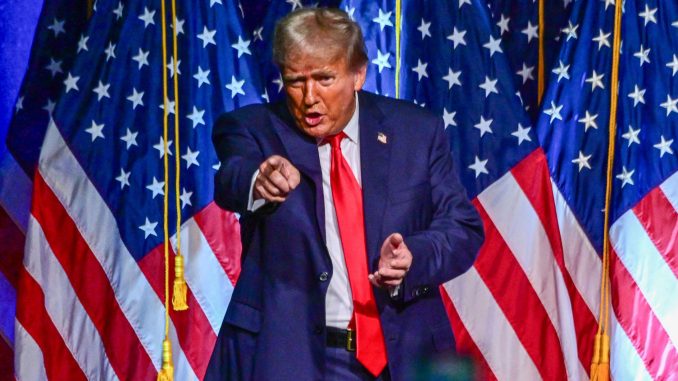
Declaring “I do not need to hear any campaign rhetoric in my court,” a federal judge known for strict sentencing of Jan. 6 Capitol riot defendants on Monday imposed a gag order on former President Donald Trump.
U.S. District Court Judge Tanya Chutkan, who is overseeing the case in which Trump is charged with four felony counts of conspiracy, approved the gag order sought by special counsel Jack Smith.
Chutkan has yet to issue a written ruling, but during a more than two-hour court hearing, from the bench she said the court would restrict the 45th president and candidate for the 2024 Republican presidential nomination from denigrating Smith or the special counsel’s staff or court staff, and from speaking about witnesses who may testify in the case.
The judge did, however, deny the special counsel’s broader request to prevent Trump from publicly criticizing the District of Columbia as a jury pool, or to restrict Trump from criticizing the Biden administration or the Justice Department.
That marks the second gag order against Trump this month. A New York state judge imposed a limited gag order on Trump in the civil trial brought by New York Attorney General Letitia James to prevent the former president from talking about court staff.
Federal prosecution of a former president running for another term is already unprecedented, and the gag order adds another unprecedented dimension to the case, said Zack Smith, a former assistant U.S. attorney for the Northern District of Florida, told The Daily Signal.
“Donald Trump’s prosecution as a former president running again for president is already an unprecedented situation,” said Smith, now a legal fellow at The Heritage Foundation. “Now it is even more unprecedented.” (The Daily Signal is the news outlet of The Heritage Foundation.)
“There are some troubling aspects to this gag order, in that it limits what [Trump] can say about witnesses,” Smith continued. “One potential witness is [Trump’s onetime vice president] Mike Pence. Trump and Pence are both running for the Republican nomination.”
Most criminal cases against public officials happen after the official is out of office, Smith noted. He added that a comparison to watch could be the federal corruption indictment of Sen. Bob Menendez, D-N.J., who like Trump has also been a vocal critic of prosecutors.
The four-count, 45-page indictment accuses Trump of “three criminal conspiracies.” One is a “conspiracy to defraud the United States using dishonesty, fraud and deceit.” Another alleges “a conspiracy to corruptly obstruct and impede” the Jan. 6, 2021, congressional certification of votes. The third alleges “a conspiracy against the right to vote.”
Trump also faces federal charges in Florida over alleged mishandling of classified information and criminal charges in Georgia related to the 2020 election. The former president was also indicted in New York City related to allegations of paying “hush money” to porn star Stormy Daniels. Trump denies wrongdoing in each of the cases.
Chutkan, an appointee of President Barack Obama, formerly worked at Boies, Schiller & Flexner LLP, a Democrat-leaning law firm, where President Joe Biden’s son, Hunter Biden, previously worked.
As a judge, Chutkan has sentenced at least 38 people convicted of Capitol riot-related crimes to jail or prison terms, The Associated Press reported. The AP has reported that Chutkan was the only judge of about two dozen presiding over prosecutions of about 600 Jan. 6 defendants who routinely imposed sentences that exceeded what federal prosecutors had asked for. She either matched or exceeded prosecutors’ recommendations in 19 of the 38 sentences after other judges handed down sentences more lenient than what prosecutors sought.
The Trump campaign responded in a statement saying the former president “will continue to fight for our Constitution” and against the “chains of weaponized and targeted law enforcement.”
Smith, of the Heritage Foundation, noted there is constitutional precedent for gag orders in criminal cases, but such matters are typically disfavored because of free speech concerns.
“The First Amendment concerns in a normal criminal case are amplified in the circumstances of this case,” Smith said. “Judges are, by and large, hesitant to impose gag orders.”
Trump’s federal trial in Washington is set to begin in March 2024.
“First Amendment protections yield to the administration of justice and the protection of witnesses,” Chutkan said Monday, according to CBS News. She added, “Mr. Trump is a criminal defendant. He is facing four felony charges. He is under the custody of the criminal justice system. He does not have the right to say and do exactly as he pleases.”
Have an opinion about this article? To sound off, please email letters@DailySignal.com, and we’ll consider publishing your edited remarks in our regular “We Hear You” feature. Remember to include the URL or headline of the article plus your name and town and/or state.

